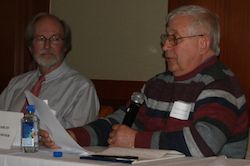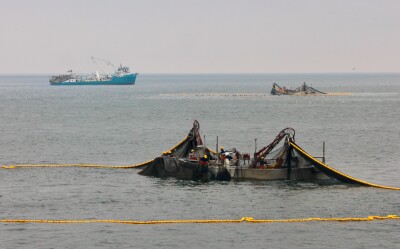Stakeholders gathered in Boston on March 2 for the Sustaining Massachusetts Fisheries summit, a session held to improve understanding of the importance of bolstering Bay State fisheries. Summit topics largely concerned problems facing the groundfish industry, and offered some ideas of what can be done to improve the fishery's fortunes.
Participants included representatives from the fishing and seafood industries, environmental groups and federal and state agencies plus federal, state and local elected officials. All noted that commercial fishermen can and must play a stronger role in devising solutions to the groundfish industry's problems. Frank Mirarchi, a Scituate, Mass., fisherman, was among the summit panelists who shared his thoughts on the fishery's woes.
Panelist Frank Mirarchi (right), a veteran Scituate, Mass., fisherman, delivers his presentation at the Sustaining Massachusetts Fisheries stakeholder summnit, as David Pierce, deputy director of the Massachusetts Division of Marine Fisheries, looks on. Linc Bedrosian photo"It is an industry and a management system struggling to make a fishery work without sufficient resources," said Mirarchi, a 1988 NF Highliner who's long been involved in Massachusetts fisheries management issues. Scientists are frustrated that stock condition projections aren't materializing, he said, and fishermen are angry that annual catch allocations fluctuate so wildly that they can't write business plans.
"Historic fishing communities with roots dating to colonial times are at risk of vanishing," he said.
Mirarchi added that industry and management have parted ways, with each side mistrusting the other. And the Magnuson-Stevens Act obligates managers "to treat nature as if were static and prescriptive," he said.
"We see phenomena such as changing natural mortality rates, shifting growth rates, new sources of predation, displacement of traditional stocks and the appearance of new migrants in unexpected places," Mirarchi added.
Mirarchi and other summit speakers, including U.S. Rep. William Keating (D-Mass.), University of Massachusetts, Dartmouth School for Marine Science and Technology scientists Kevin Stokesbury and Steve Cadrin, and William Karp, the NMFS northeast region's research and science director, said fishermen can provide important data that can help document climate change and improve the stock assessments that are crucial to fisheries management.
"If we were to design and fund an industry-based abundance survey using standardized gear and practices, this would provide an index to supplement and ground truth the existing NMFS and state surveys while adding spatial and temporal detail not now available," Mirarchi said.
Particpants in the summit hosted by the Massachusetts Marine Fisheries Institute (a partnership of the School for Marine Science and Technology and the state's Division of Marine Fisheries) and the DMF all stressed that a collaborative approach that includes fisherman participation will be needed to fix the Massachusetts groundfish fishery's woes. Mirarchi agreed.
"When the fishing industry is perceived as an active partner rather than solely as the source of fishing mortality which must be constantly controlled, we can work as partners rather than adversaries," Mirarchi said. "When there is mutual confidence in the data, decisions can gain a stature above the 'least harmful of a series of bad choices' criterion often applied today."







